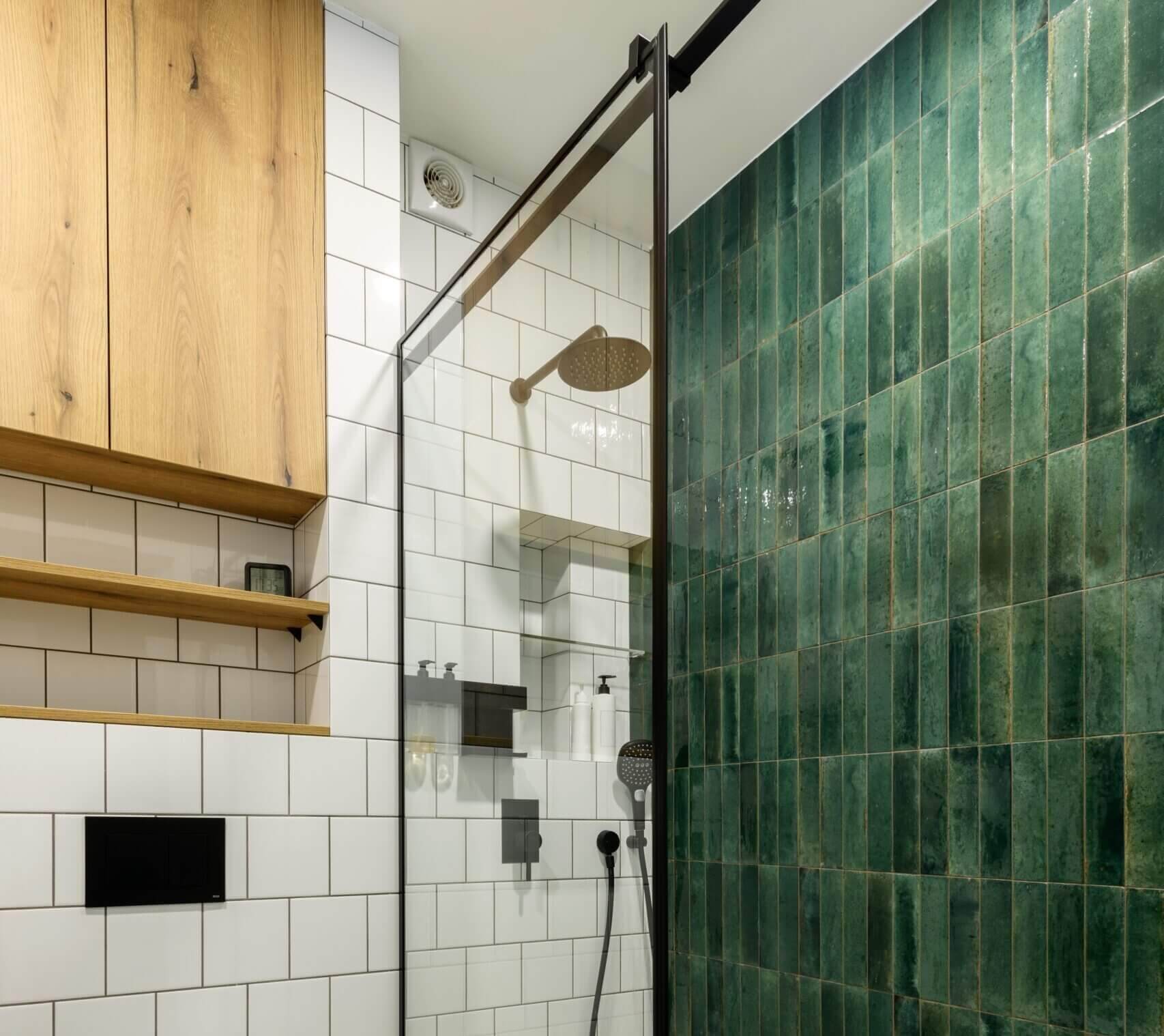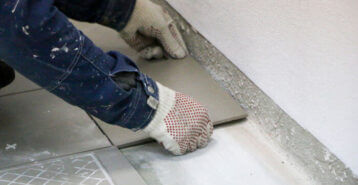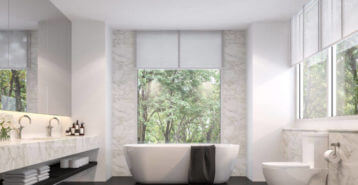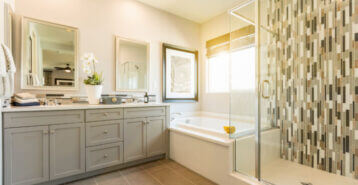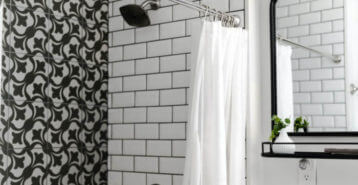Are you doing a bathroom remodel project?
Modernize can pair you with three to four pros in your area, so you can compare options and save time and money.
How to Find the Right Tile for Your Shower
Looking to upgrade your home’s bathroom in 2026? Choosing the best tile for your shower can enhance the look, functionality, and durability of your bathroom. In this guide, we cover the top tiles for shower floors and walls, tiles to avoid, and tips on tile placement to help you create the perfect shower. Remember that tile isn’t just a design choice. It also serves the important purpose in keeping your bathroom free of moisture damage.
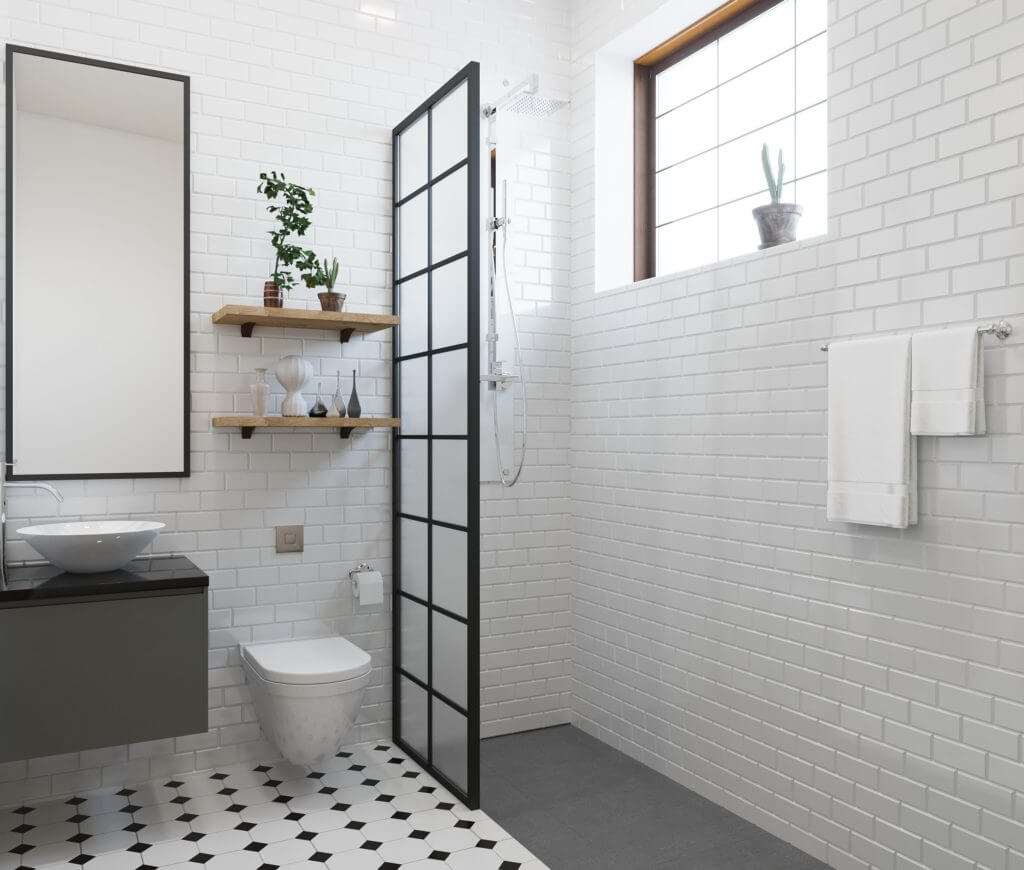
Best Tile for Shower Floors
When picking out the best shower tiles for a remodel, consider these factors:
- Cost
- Safety
- Water-Resistance
- Appearance
While some homeowners choose the same type of tile to cover their shower floors and walls, shower floors should get special attention for safety purposes.
When showering, safety is key, especially when it comes to slippery floors. Choosing smaller or mosaic-style tiles provides better grip underfoot. Textured, matte tiles also help prevent slips and falls. To ensure your tile is safe for wet areas, check its dynamic coefficient of friction (DCOF) rating. Experts recommend a DCOF rating of 0.42 or higher for shower floors.
Mosaic shower tiles also come in a few different options for materials to fit most budgets. Below you will find the best tile choices for shower floor materials.
Porcelain and Ceramic Tiles Are Durable Options for Your Shower Floor
Porcelain and ceramic tiles are popular choices for shower floors due to their durability and water resistance. These tiles are made from dense materials, making them highly resistant to water, stains, and scratches. They come in a wide variety of colors, patterns, and sizes, allowing for great design flexibility. Additionally, they can be found in textured finishes that reduce the risk of slipping, enhancing safety.
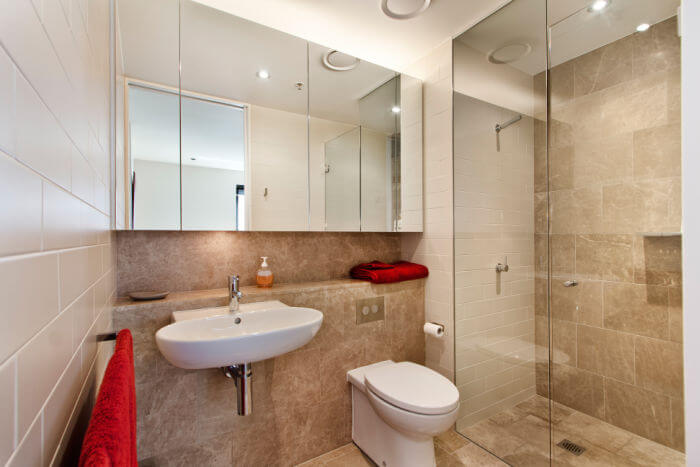
However, porcelain and ceramic tiles can be challenging to install, often requiring professional help to ensure proper waterproofing. They can also feel cold underfoot unless paired with radiant floor heating, which is an additional consideration for comfort.
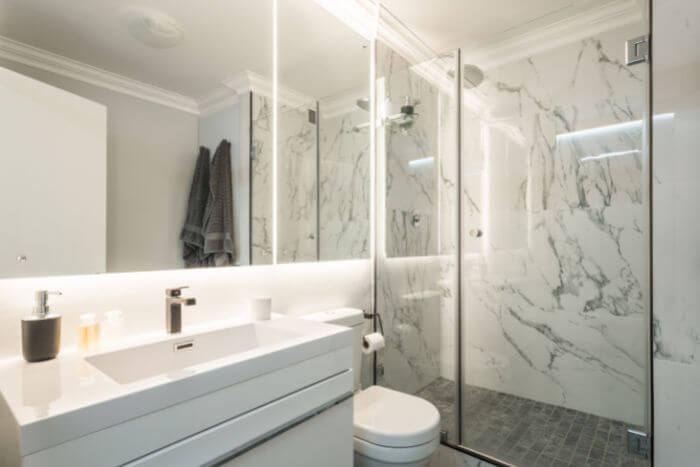
The cost of porcelain and ceramic bathroom tile varies depending on the quality, design, and size of the tiles. On average, homeowners can expect to pay between $3 to $10 per square foot for ceramic tiles. Porcelain tiles, known for their higher durability and water resistance, typically range from $5 to $15 per square foot.
Installation costs for both types of tile usually add an additional $5 to $10 per square foot, depending on the complexity of the job and local labor rates. High-end designer tiles or custom patterns may increase the overall cost, but there are numerous options available to fit different budgets and design preferences.
Best Tiles for Shower Walls and Backsplashes
Ceramic and porcelain tiles are ideal for shower floors, but they also work well on shower walls due to their waterproof and non-slip qualities when glazed. In fact, many U.S. homes feature these tiles on shower walls. However, since shower walls experience less direct contact with water than floors, additional tile options may also be suitable.
When selecting shower wall tiles, consider factors like ease of cleaning, tile size, appearance, water resistance, and cost. Larger tiles can be a great choice since they don’t require the same level of slip resistance as shower floors. Some homeowners also mix and match their shower floor and wall tiles to create a more modern, customized look
In addition to ceramic and porcelain, you might want to consider the following materials for shower walls and shower backsplash tiles.
Large Format Tiles for a Modern Shower
Large format tiles are ideal for creating a sleek, modern look in your shower. These tiles cover more area with fewer grout lines, which not only looks great but also makes cleaning easier. The minimal grout lines reduce the chances of mold and mildew growth, contributing to a cleaner shower environment.
However, large format tiles can be more challenging to install due to their size. Professional installation is often required to ensure a smooth and even application. Despite this, the end result is a visually appealing, low-maintenance shower wall.
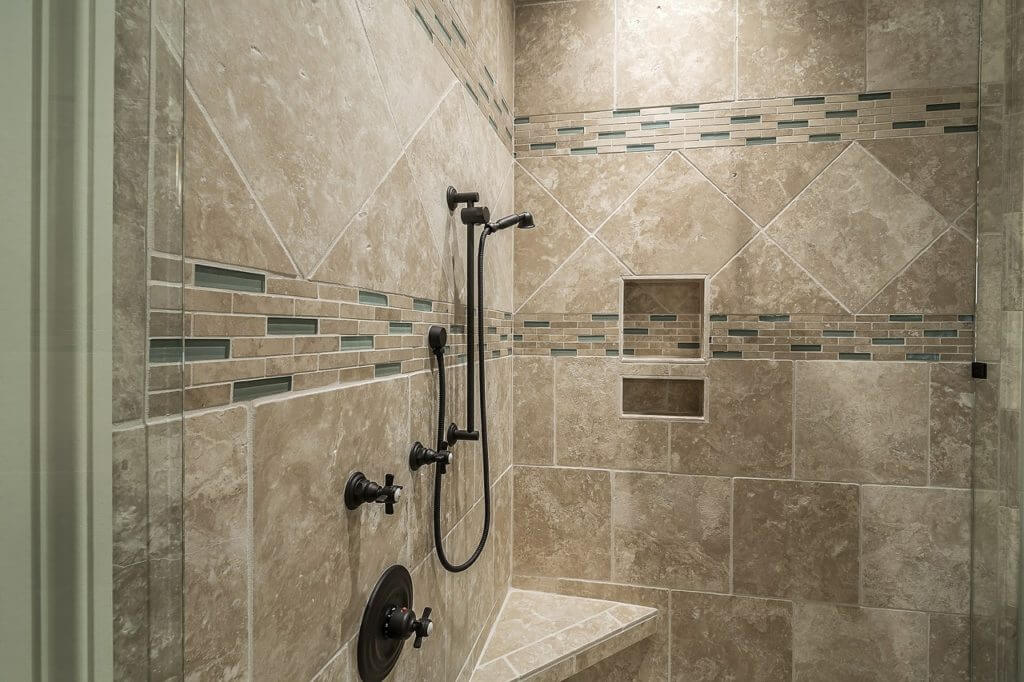
Add Timeless Appeal to Your Shower With Subway Tiles
Subway tiles have a timeless appeal and are a versatile option for shower walls and backsplashes. They fit well with various design styles, from traditional to modern, and their classic look never goes out of style. Subway tiles are relatively easy to install and are available in a variety of colors and finishes.
Find the Right Contractor for Your Bathroom Remodeling Project
Whether you’re ready to begin your project now or need some expert advice, our network of contractors are here to help. With a few simple questions, we’ll find the best local professionals for you

The main downside of subway tiles is the grout maintenance. The numerous grout lines can become a breeding ground for mold and mildew if not properly maintained. Regular cleaning and occasional re-grouting are necessary to keep them looking their best.
Glass Tiles Add a Touch of Luxury to Your Bathroom
Glass tiles are a beautiful and reflective option for shower walls, adding depth and light to the space. They are available in many colors and finishes, allowing for unique and vibrant designs. Glass tiles are non-porous, making them resistant to stains and easy to clean.
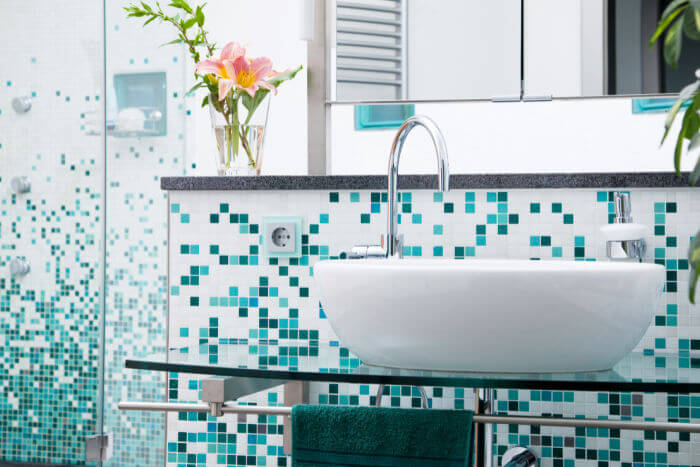
Glass tiles can give your shower a bright, airy, and transparent appearance. For smaller bathrooms, this can help to lighten the space and make the room appear larger – especially when paired with sleek frameless glass shower doors.
The main drawback of glass tiles is their cost. They can be more expensive than ceramic or porcelain tiles, and their installation requires precision to avoid visible adhesive. Additionally, if they are not properly maintained, they can show water spots and soap scum more readily.
Tiles to Avoid in Showers
Choosing the wrong type of tile can lead to issues with maintenance, safety, and longevity. Here are some tiles to avoid for showers:
- Glossy Finish Tiles: Glossy finish tiles may look appealing, but they can be highly slippery when wet, posing a significant safety risk in a shower environment. The slick surface increases the likelihood of slips and falls, making them a poor choice for shower floors and walls.
- Soft Stone Tiles (Marble, Limestone): While marble and limestone can add a touch of elegance to any bathroom, they are highly porous and prone to staining and etching. These soft stone tiles require frequent sealing and maintenance to prevent damage from water and cleaning products. Their high maintenance needs and vulnerability to damage make them less suitable for showers.
- Large Format Tiles on Floors: Large format tiles can be problematic on shower floors due to their size. They provide fewer grout lines, which means less grip and an increased risk of slipping. Additionally, their large size can make it difficult to properly slope the floor towards the drain, potentially leading to drainage issues.
Ceramic and Porcelain Tiles: A Versatile Choice
As we mentioned before, ceramic and porcelain tile can be made into practically any shape in a variety of sizes, colors and prints. This means you can also go for that natural stone look without having to worry about the cost or upkeep of the real thing.
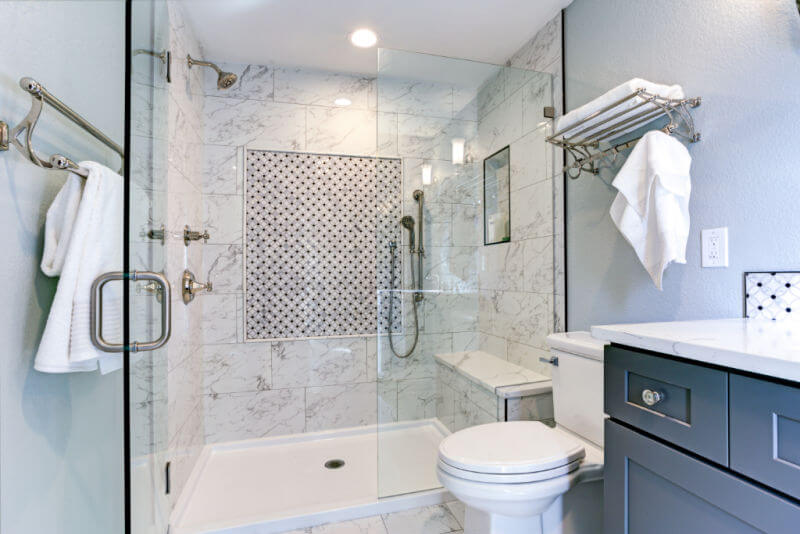
If you love the look of marble, stone, wood, or concrete, glazed porcelain and ceramic tiles can replicate these styles beautifully. Not only will your shower have a high-end look, but it will also be easy to clean and durable enough to withstand moisture for decades.
Where to Stop Tile in a Shower: 8 Feet or Ceiling?
Deciding where to stop your tile can impact both the aesthetic and functionality of your shower.
Tile Up to 8 Feet
Tiling up to 8 feet is a common choice that offers several advantages. It is more cost-effective than tiling all the way to the ceiling because it uses less material and requires less labor. This height provides adequate protection from water in most shower areas and maintains a traditional look that is familiar in many homes.
However, stopping at 8 feet can leave the upper walls vulnerable to water damage, especially in steam showers. Additionally, painted walls above the tile can be harder to clean and maintain, potentially leading to mold and mildew issues over time.
Tile Up to the Ceiling
Tiling up to the ceiling offers complete protection against water damage, making it an excellent choice for wet environments. This option provides a seamless, modern appearance that can make the shower area feel larger and more open. Full-height tiling also eliminates the need for additional maintenance of painted surfaces.
The main disadvantage of tiling up to the ceiling is the higher cost, as it requires more materials and labor. The installation process is also more complex, often requiring professional help to ensure a flawless finish.
Finding a Professional Shower Tile Installer
Selecting the best tile for showers involves balancing aesthetics, functionality, and maintenance. Porcelain, ceramic, and mosaic tiles are excellent choices for floors, while large format, subway, and glass tiles are ideal for walls and backsplashes. Avoid glossy finishes and soft stone tiles to prevent safety hazards and excessive maintenance. Additionally, consider tiling up to the ceiling for complete protection and a modern look.
If you are in the process of planning a larger bathroom remodel, we recommend taking a look at our full bathroom remodel guide. We can answer any questions you might have about the remodeling process, and point you in the right direction for exploring types of showers, sinks, bathtubs, and more. If you are ready to speak with a contractor, take advantage of our growing network of trustworthy contractors in your area to compare the best prices.
Find the Right Contractor for Your Bathroom Remodeling Project
Whether you’re ready to begin your project now or need some expert advice, our network of contractors are here to help. With a few simple questions, we’ll find the best local professionals for you
Reviews from Real Homeowners
Welcome to Homeowner Resources! We are the Modernize blog. Modernize pairs more than 3 million homeowners a year with pre-vetted contractors in their area. This blog started because we believe homeowners should know everything about their homes, from how their HVAC works to which front door colors they might love. On Homeowner Resources, you can find information on every part of your home, right down to how you can negotiate with contractors to get the best price. Here's more about the blog.
Need a contractor? Learn more about how Modernize finds the right pro for you.
